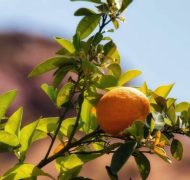What the Earth Gives
Blog / Produced by The High Calling
I am walking with my boy and my dog on New Year’s Eve, stepping light and enjoying unseasonably warm weather. We feel the freedom of shedding the winter trappings—no hat, no gloves, no puffy coats or boots. This unfettering allows us to move along with fluid joy—Lucy Mae straining at leash.
Do you have any New Year’s resolutions? I ask him, as we head down to the creek.
I want to be healthier, he says.
What will you do to be healthier?
Eat better. Eat more vegetables. Less fast food. And exercise. I want to exercise more.
I am a wee bit disturbed that my eleven-year-old is preoccupied with such things. But I know he is right. We have fallen into the same trap so many families do: hurry, hurry, hurry; giving only a second thought to what we put in our bodies.
In the midst of plenty, we have forgotten how to eat, says Leslie Leyland Fields, the editor of The Spirit of Food: 34 Writers on Feasting and Fasting toward God. This collection of essays —our new book club selection—is teaching me mindfulness. This reading leads me into a greater awareness of what I turn to for nourishment.
We read the first five essays this week--tasted Wild Fruit with Patty Kirk, savored Late October Tomatoes with Brian Volck, shopped The Communion of Saints with Jeanne Murray Walker, dipped hands deep into The Land that Is Us with Ann Voskamp, and—appropriately so--studied a recipe For a Sweet New Year with Margaret Hathaway.
I think about the words from these first selections as I study my son’s profile. Does he understand the deeper implications of his words? My boy is making plans, but it is my husband and I who need to make these changes.
From the earliest chapters of human history, we have not only gathered and hunted but combined what we amassed of God’s creation with other wonderful creations—salt, honey, fragrant greens, clean dry air, fire—and made our own, admittedly lesser, creations. We cooked before cookbooks. And before civilization as we know it now. Before we knew we were cooking but were only mindlessly mimicking the divine impulse to create something new and good. Cooking, for me, is the emulation of the deity’s most essential habit: to create. As such, to cook is to worship. (Patty Kirk, Wild Fruit)
Does my little one have an inkling of how food can connect us to the past--to those we love—and therefore connect us better with that holiness inside each one of us?
When I take time to cook attentively, observing the ritual my mother taught me, there’s a way in which my parents and benefactors, living and dead, are present. (Brian Volck, Late October Tomatoes)
Does he know the rhythm of the seasons? How each one prepares him for the ebb and flow of life and teaches him to yearn for more?
…I like craving what’s not there, looking forward to the first whiff of asparagus in the spring, anticipating the way it resists a fork, imagining its buttered taste. If I have to improvise meals around what’s available, I feel in partnership with the earth. If I have to think about collaborating with nature, I remember I am not the creator; I am a creature. (Jeanne Murray Walker, The Communion of Saints)
What does he taste when he bites into the food laid before him? Does he taste sacrifice? Does he taste the earth opened up for him?
…Though what we raise may be dying food, it too is symbolic of the Christ who chose agricultural elements such as a kernel of wheat, bread and wine, vine and lamb, to name and speak of himself, the Living Food… (Ann Voskamp, The Land that Is Us)
I look at my boy and think all these things and know I must do better. I want him to understand what the earth gives...the many reasons why we must be more deliberate about what we eat.
Just as we are children of God, we are parents of our children and we are guardians of the land and its creatures. In our family’s agrarian practice of our faith, that is the circularity we celebrate at this holiday. As we do so often in Judaism, at Rosh Hashanah we say Shehechiyanu to thank God for sustaining us and enabling us to reach the holiday. Implicit in the prayer is gratitude for the responsibilities of our lives, for the sweetness that comes with the ties that bind us. We do our best, and we are thankful. (Margaret Hathaway, For a Sweet New Year)
I was thinking about planting a garden in the back yard this summer, I say to him as we walk. Like I used to when you were a baby. We could grow our own vegetables…that would be a good way to healthier eating. Would you like to help me with that?
His face is pensive and I know he’s stuck on the vegetables.
If we grow tomatoes, I say, we can make our own pizza sauce.
His face brightens.
We can call it Boggess’s Best Pizza Sauce!
He’s into it now.
We finish out the walk brainstorming names for our brand. And as we teeter in between the old year and the new, it feels possible. We can make this change.
Food is nothing less than sacrament. All food is given by God and is given as a means to sustain not just our bodies, but also our minds and our spirits. In all of its aspects—growth, harvest, preparation, and presentation—food is given as a primary means of drawing us into right relationship toward God, toward his creation and his people. Even its intentional absence, through fasting, pulls us toward a deeper dependence on God and one another. (Leslie Leyland Fields, editor, The Spirit of Food)
As a special treat, Laity Lodge’s Executive Chef, Tim Blanks, will be sharing some of his recipes with us during our book club discussions. Thanks, Tim! Here’s the first. Enjoy!
Winter Mediterranean pesto
This pesto has a strong heady aroma and is delicious in soups and dishes with a tomato base. It brings forth the flavors of sautéed vegetables very nicely. Added to the juices’ of chicken or lamb it makes a delightful basting sauce .
2 large garlic cloves
2 teaspoons dried rosemary
1-1/2 teaspoons dried thyme
1 teaspoon dried summer savory
1 teaspoon dried oregano
1 cup chopped parsley (fresh)
1/3 cup freshly grated Parmesan
1/2 cup pine nuts or walnuts (must less expensive)
1/3 cup olive oil
Salt/ fresh ground pepper
Combine the garlic, rosemary, thyme, summer savory, oregano, parsley, cheese, and nut in a blender. Mix with the blender running and slowly add olive oil. Season to taste with salt and freshly ground pepper. Let stand 5 minutes before serving.






